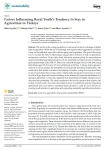Ayyildiz B., Erdal G., Ciçek A., Ayyildiz M. (2025). Factors influencing rural youth’s tendency to stay in agriculture in Türkiye. Sustainability, 02/04/2025, vol. 17, n. 8, p. 3313.
https://doi.org/10.3390/su17083313
https://doi.org/10.3390/su17083313
| Titre : | Factors influencing rural youth’s tendency to stay in agriculture in Türkiye (2025) |
| Auteurs : | B. Ayyildiz ; G. Erdal ; A. Ciçek ; M. Ayyildiz |
| Type de document : | Article |
| Dans : | Sustainability (vol. 17, n. 8, April 2025) |
| Article en page(s) : | p. 3313 |
| Langues : | Anglais |
| Langues du résumé : | Anglais |
| Catégories : |
Catégories principales 06 - AGRICULTURE. FORÊTS. PÊCHES ; 6.1 - Généralités. Situation AgricoleThésaurus IAMM INSTALLATION DES JEUNES ; INSTALLATION A LA TERRE ; AGRICULTURE ; MAIN D'OEUVRE ; MOTIVATION ; TURQUIE |
| Résumé : | The decline in the young population in rural areas has led to a shortage of skilled labor in agriculture. While the use of technology and capital is often suggested as a solution, it may not be sufficient, especially with the aging rural population. The goal of this study was to examine the factors influencing young people's decisions to stay in agriculture, and propose solutions. On the other hand, this study presents policy recommendations aimed at strengthening implementation tools for sustainable development and revitalizing global partnerships under SDG 17. Data were collected through surveys with 2398 young individuals aged 15-29 across 27 rural settlements in Turkey. A binary logit regression model was used to analyze the probability of young people remaining in agriculture. The results show that, similar to studies in developing economies, young men were more likely to stay in agriculture than young women. Additionally, having personal income or assets, as well as larger land and livestock holdings in the household, increased the likelihood of staying in agriculture. Conversely, migration from households and higher education levels decreased the probability. The study emphasizes the need for projects that improve the welfare of rural youth. Economic development alone is insufficient; policies integrating agricultural and social factors, including family dynamics, could be more effective in ensuring youth retention in agriculture and supporting sustainable agricultural production. |
| Cote : | En ligne |
| URL / DOI : | https://doi.org/10.3390/su17083313 |







